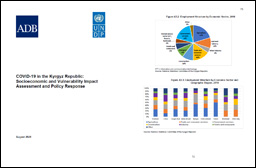BISHKEK (ADB press service) — The Kyrgyz Republic can address the socioeconomic challenges related to the coronavirus disease (COVID-19) pandemic by moving aggressively to strengthen the health system, expand social protection and employment, and improve transparency in the government’s pandemic response. This is according to a joint study by the Asian Development Bank (ADB), the United Nations Development Programme (UNDP), and the Economic Policy Research Institute in the Kyrgyz Republic’s Ministry of Economy.

- COVID-19 in the Kyrgyz Republic (PDF)
- Socioeconomic and Vulnerability Impact Assessment and Policy Response
(Click to download)
The report, COVID-19 in the Kyrgyz Republic: Socioeconomic and Vulnerability Impact Assessment and Policy Response, describes how the global, regional, and local macroeconomic shocks are affecting the Kyrgyz Republic’s population, including informal segments, labour markets, people in urban and rural areas, and vulnerable groups. It also discusses the pandemic’s socioeconomic impacts on poverty and food security, as well as the adequacy of government policies. The report expects a 10% gross domestic product decline in 2020; a decline of up to 25% in remittance inflows; and increases in poverty and socioeconomic vulnerability. In the worst-case scenario, the unemployment rate could jump to 21%.
Substantial losses forecast in major economic sectors such as tourism, trade, consumer services, and construction are expected to hit those working informally in urban areas, many of whom are not covered by any form of social protection. Survey research conducted for the assessment also found that micro-entrepreneurs, people living with disabilities, and families with many children are particularly vulnerable to the socioeconomic impact of the pandemic.
To mitigate this, the assessment sets out integrated policy recommendations which include increasing investment in health services for vulnerable communities; supporting small businesses; ensuring gender-appropriate humanitarian assistance for labour migrants stranded in destination countries; upscaling social assistance covering the new vulnerable groups; more job opportunities; and capitalizing on opportunities to “build back better”.
The assessment takes into account results from surveys and benefits from key contributions from development agencies in the Kyrgyz Republic, including the UN Country Team such as the World Food Program, UN Population Fund, UN Economic and Social Commission for Asia and the Pacific, Food and Agriculture Organization of the UN, World Health Organization, International Labour Organization, International Organization for Migration, United Nations Children’s Fund (UNICEF), UN Women, and UN Educational, Scientific, and Cultural Organisation, as well bilateral and multilateral organizations in Kyrgyzstan.
UNDP’s COVID-19 crisis response is designed to help decision-makers look beyond recovery, towards 2030, making choices and managing complexity and uncertainty in four main areas: governance and agency, social protection, green economy, and digital disruption. This includes focus on rule of law and e-governance, investments in digitalization and the green economy, strategies for informal sector workers, and design of a new generation of resilient, green jobs that support youth-led entrepreneurship. As part of the UN system response to COVID-19, UNDP mobilized $2.8 million for early support to the health sector in Kyrgyz Republic and has realigned its country operation to support resilient recovery following the pandemic.
On the ground in nearly 170 countries and territories, UNDP offers global perspective and local insight to help empower lives and build resilient nations.
ADB has provided $50 mln in budget support to help the Kyrgyz Republic mitigate the health and socioeconomic impacts of COVID-19 in May, followed by $20 mln in emergency assistance to help strengthen the health sector in June. Earlier in April, ADB approved $200,000 followed by an additional $800,000 for emergency medical assistance to help the Kyrgyz Republic procure medical supplies and equipment.

